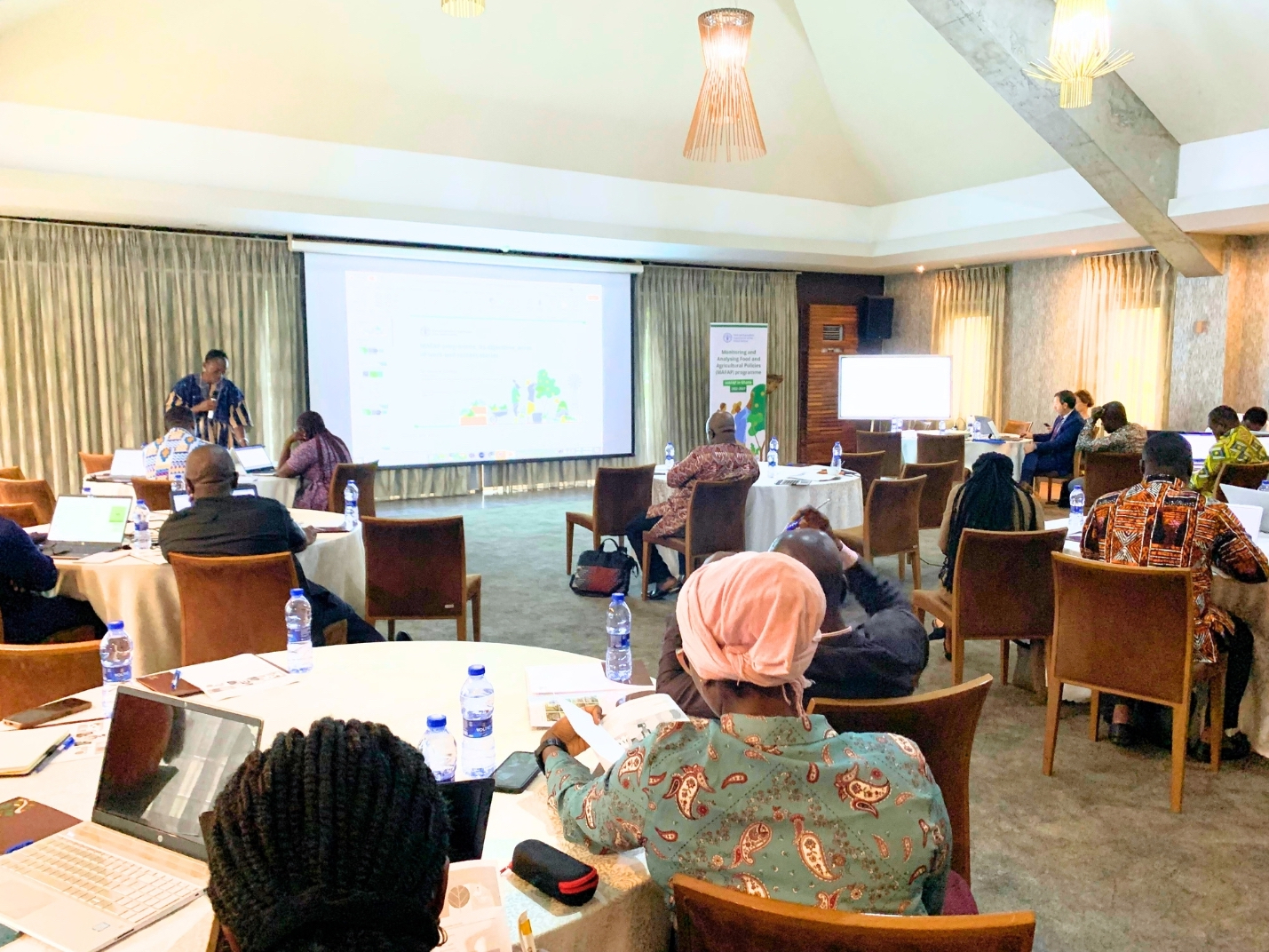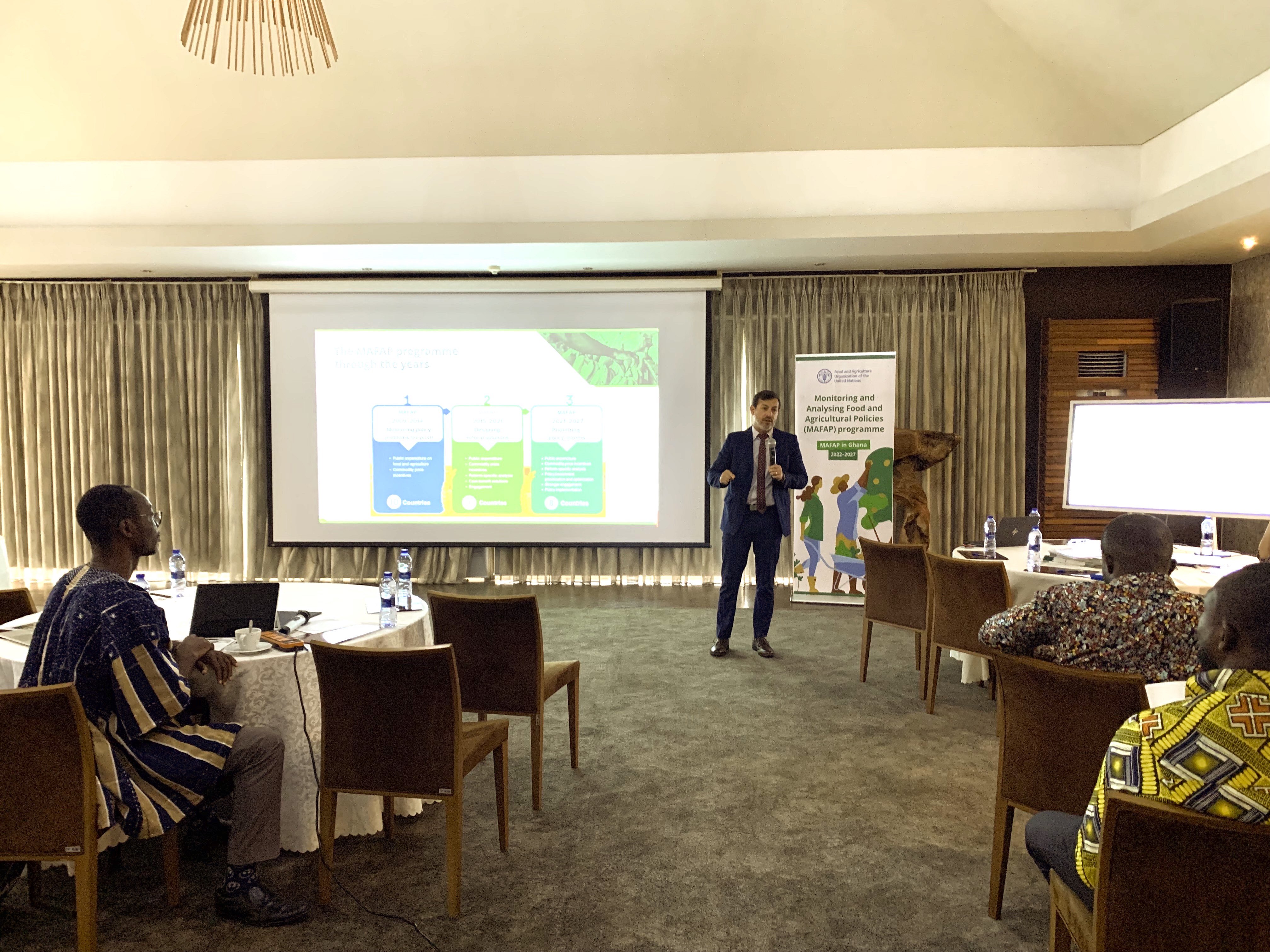MAFAP hosts policy-dialogue event to boost potential of Ghana’s agrifood sector
The Monitoring, Prioritizing and Optimizing Public Investments in the Agrifood Sector for Greater Socioeconomic Impact in Ghana workshop brought together over 30 representatives from government institutions to engage with policymakers on new economic analyses

The Monitoring and Analysing Food and Agricultural Policies (MAFAP) programme organized a workshop in Ghana to bring together various government ministries and institutions to present new findings from monitoring agrifood policies in the country and to engage in policy dialogue with national policymakers.
Opening the day-long workshop in Aburi, in Ghana, Assistant FAO Representative Benjamin Adjei welcomed over 35 officials from across government and agribusiness stakeholders. This included attendees from the Ministries of Food and Agriculture, of Trade and Industry, of Lands and Natural Resources, as well as the National Development Planning Commission, Ghana Statistical Service, Peasant Farmers’ Association of Ghana, and the Chamber of Agribusiness Ghana, who came together to engage in new evidence emerging from monitoring public policies and expenditures in Ghana. They would also be shown a new state-of-the-art policy optimizing tool that MAFAP developed specifically to support governments.
Starting the first presentation on the MAFAP programme, Deputy Director for Agrifood Economics and Policy at FAO, Marco V. Sánchez, highlighted the 15 year-long history between MAFAP and Ghana – with Ghana being one of the main MAFAP partner countries since its first phase back in 2009 and is currently part of part of the 2022–2027 third phase – and how new activities are picking up speed.
 |  |
Commodity price incentives in Ghana
Turning to monitoring policies in Ghana, Renata Baborska presented the most recent evidence from analysing price indicators for 5 commodities that are key in Ghana: groundnuts, maize, palm oil, rice, and yam. These results gave way to a lively discussion among the participants about the existing inefficiencies in these value chains and the non-remunerative prices for producers, and how the issue of high food inflation and lack of competitiveness of the local products could be addressed by appropriate policies.
Public spending on food and agriculture
Renata then showed new updates on Ghana’s public spending on food and agriculture from 2016 and 2020. One finding that the participants found especially striking was the low level of government spending in the sector and the issue of poor budget implementation, which could be easily fixed by spending better, without increasing the budget.
Optimizing Ghana's budget
In an effort to support Ghana to spend the resources better, Marco V. Sánchez, gave a talk on MAFAP's policy optimization modelling tool. Through the new, state-of-the-art tool, he was able to show several budget scenarios to policymakers whereby the current budget allocation to food and agriculture is “optimized” to bring better benefits to the country in terms inclusive agricultural transformation and food security and nutrition.
The socioeconomic benefits would be higher by simply reallocating the resources more optimally: higher agrifood GDP growth, rural poverty reduction, more off-farm rural jobs created, and more people able to afford a healthy diet. He also presented other scenarios where the country would invest 10% more in the agrifood spending. The results show the government where they could scale-up spending on 6 policy areas (seeds, irrigation, fertilizers, extension, mechanization, and R&D) for commodities, and where to scale down.
Next steps
Following the presentations, discussions were held on the analyses and next steps were discussed. Participants will take part in a survey to give their feedback on how this evidence can concretely be used for policymaking and who and what are the key entry points on how to engage with the government.
.jpg?sfvrsn=4207aea5_1) |  |
Contact
Renata Baborska MAFAP Focal Point in Ghana [email protected]
